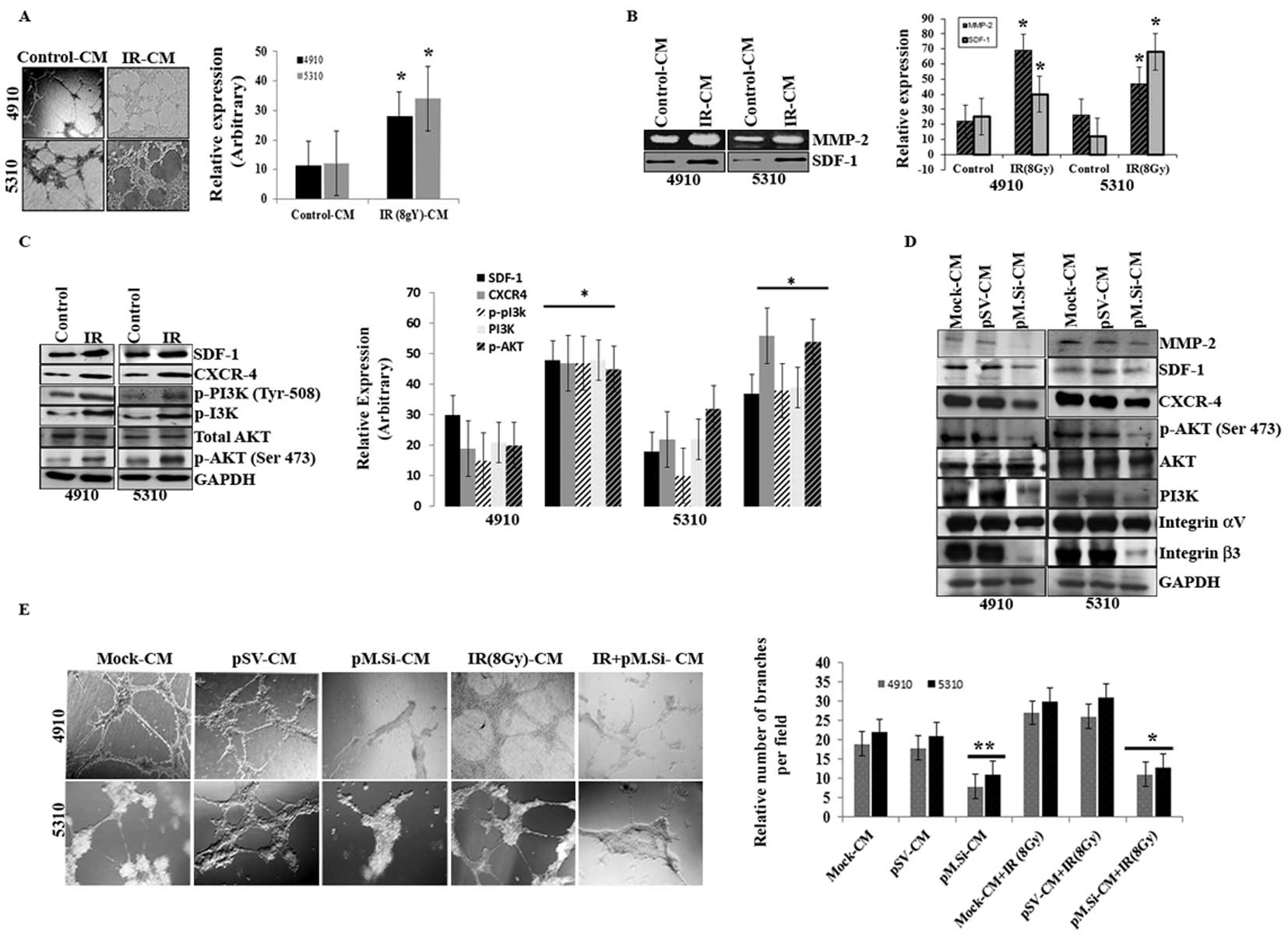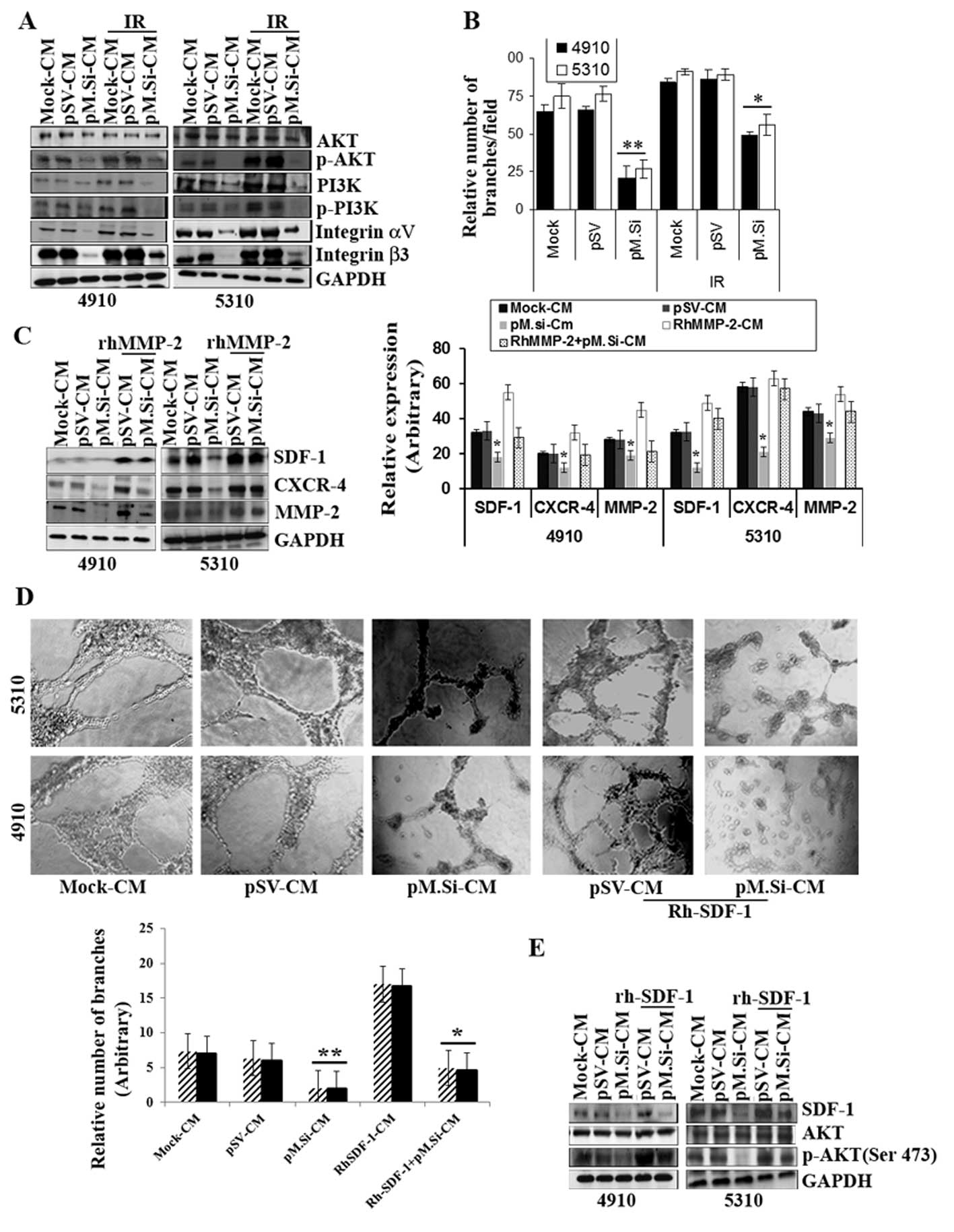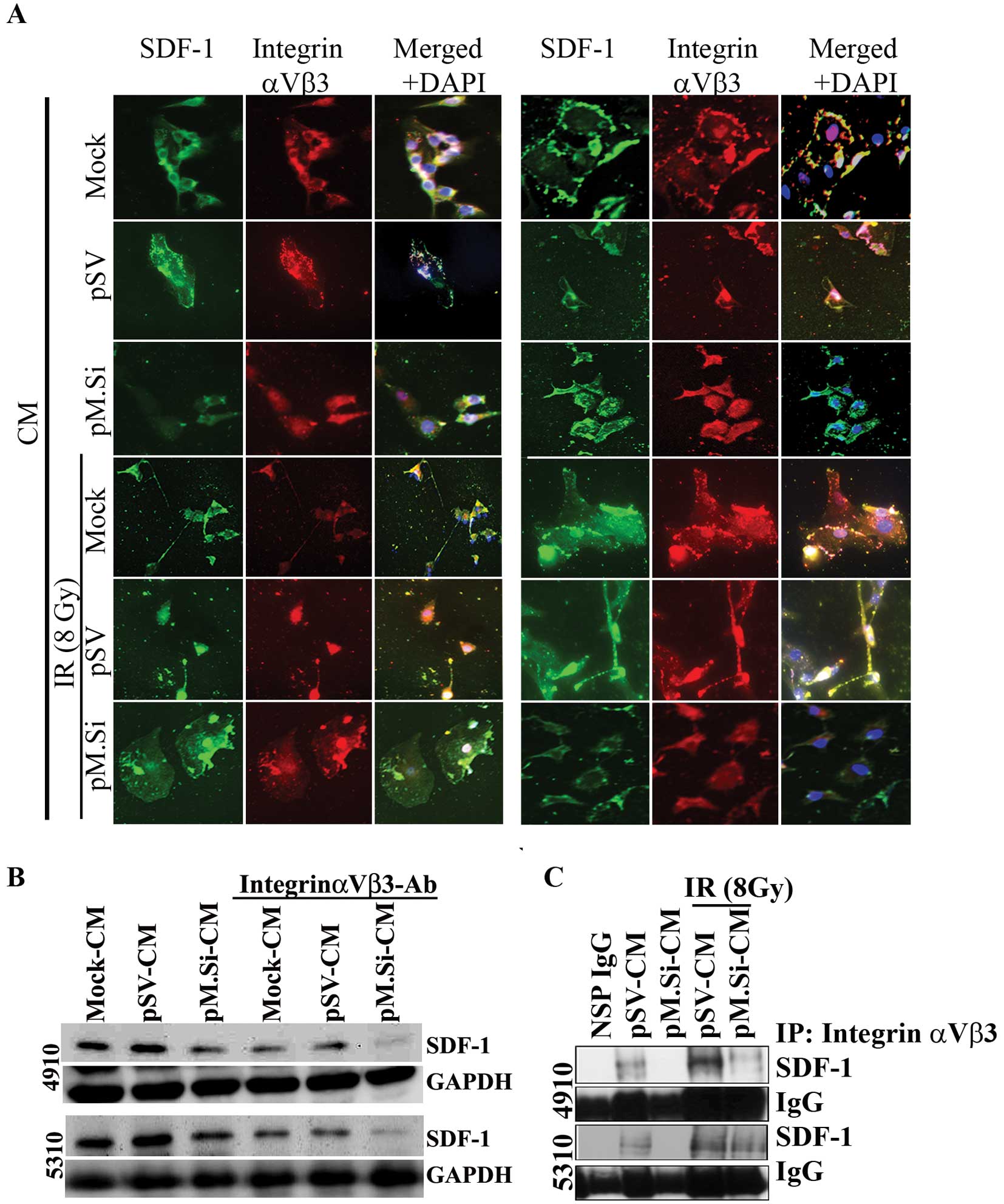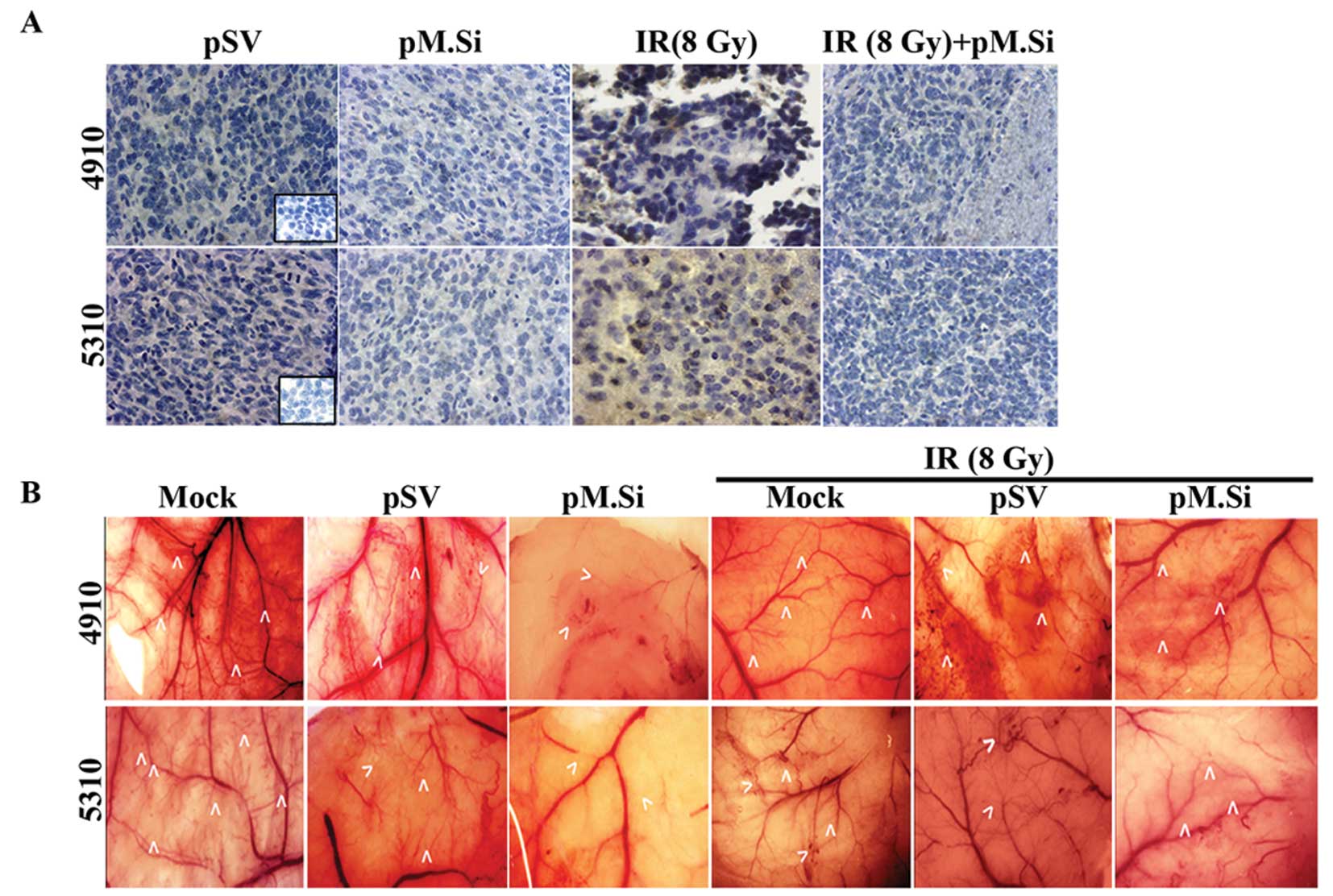|
1
|
Ribatti D and Djonov V: Angiogenesis in
development and cancer today. Int J Dev Biol. 55:343–344. 2011.
View Article : Google Scholar : PubMed/NCBI
|
|
2
|
Kargiotis O, Geka A, Rao JS and Kyritsis
AP: Effects of irradiation on tumor cell survival, invasion and
angiogenesis. J Neurooncol. 100:323–338. 2010. View Article : Google Scholar : PubMed/NCBI
|
|
3
|
Wachsberger P, Burd R and Dicker AP: Tumor
response to ionizing radiation combined with antiangiogenesis or
vascular targeting agents: exploring mechanisms of interaction.
Clin Cancer Res. 9:1957–1971. 2003.
|
|
4
|
Chetty C, Lakka SS, Bhoopathi P, Kunigal
S, Geiss R and Rao JS: Tissue inhibitor of metalloproteinase 3
suppresses tumor angiogenesis in matrix metalloproteinase
2-down-regulated lung cancer. Cancer Res. 68:4736–4745. 2008.
View Article : Google Scholar : PubMed/NCBI
|
|
5
|
Badiga AV, Chetty C, Kesanakurti D, et al:
MMP-2 siRNA inhibits radiation-enhanced invasiveness in glioma
cells. PLoS One. 6:e206142011. View Article : Google Scholar : PubMed/NCBI
|
|
6
|
Kesanakurti D, Chetty C, Bhoopathi P,
Lakka SS, Gorantla B, Tsung AJ and Rao JS: Suppression of MMP-2
attenuates TNF-α induced NF-κB activation and leads to JNK mediated
cell death in glioma. PLoS One. 6:e193412011.
|
|
7
|
Robinson SD and Hodivala-Dilke KM: The
role of beta3-integrins in tumor angiogenesis: context is
everything. Curr Opin Cell Biol. 23:630–637. 2011. View Article : Google Scholar : PubMed/NCBI
|
|
8
|
Stupack DG, Puente XS, Boutsaboualoy S,
Storgard CM and Cheresh DA: Apoptosis of adherent cells by
recruitment of caspase-8 to unligated integrins. J Cell Biol.
155:459–470. 2001. View Article : Google Scholar : PubMed/NCBI
|
|
9
|
Brooks PC, Montgomery AM, Rosenfeld M,
Reisfeld RA, Hu T, Klier G and Cheresh DA: Integrin alpha v beta 3
antagonists promote tumor regression by inducing apoptosis of
angiogenic blood vessels. Cell. 79:1157–1164. 1994. View Article : Google Scholar : PubMed/NCBI
|
|
10
|
Barbero S, Bonavia R, Bajetto A, et al:
Stromal cell-derived factor 1alpha stimulates human glioblastoma
cell growth through the activation of both extracellular
signal-regulated kinases 1/2 and Akt. Cancer Res. 63:1969–1974.
2003.
|
|
11
|
Shen XY, Wang SH, Liang ML, Wang HB, Xiao
L and Wang ZH: The role and mechanism of CXCR4 and its ligand SDF-1
in the development of cervical cancer metastasis. Ai Zheng.
27:1044–1049. 2008.(In Chinese).
|
|
12
|
Zou YR, Kottmann AH, Kuroda M, Taniuchi I
and Littman DR: Function of the chemokine receptor CXCR4 in
haematopoiesis and in cerebellar development. Nature. 393:595–599.
1998. View Article : Google Scholar : PubMed/NCBI
|
|
13
|
Kucia M, Jankowski K, Reca R, et al:
CXCR4-SDF-1 signalling, locomotion, chemotaxis and adhesion. J Mol
Histol. 35:233–245. 2004. View Article : Google Scholar : PubMed/NCBI
|
|
14
|
Giannini C, Sarkaria JN, Saito A, et al:
Patient tumor EGFR and PDGFRA gene amplifications retained in an
invasive intracranial xenograft model of glioblastoma multiforme.
Neurooncology. 7:164–176. 2005.PubMed/NCBI
|
|
15
|
Kesanakurti D, Chetty C, Dinh DH, Gujrati
M and Rao JS: Role of MMP-2 in the regulation of IL-6/Stat3
survival signaling via interaction with alpha5beta1 integrin in
glioma. Oncogene. 32:327–340. 2013. View Article : Google Scholar : PubMed/NCBI
|
|
16
|
Kesanakurti D, Chetty C, Maddirella DR,
Gujrati M and Rao JS: Essential role of cooperative NF-κB and Stat3
recruitment to ICAM-1 intronic consensus elements in the regulation
of radiation-induced invasion and migration in glioma. Oncogene.
Nov 26–2012.(Epub ahead of print). View Article : Google Scholar
|
|
17
|
Chetty C, Lakka SS, Bhoopathi P and Rao
JS: MMP-2 alters VEGF expression via aVB3 integrin-mediated PIK/AKT
signaling in A549 lung cancer cells. Int J Cancer. 127:1081–1095.
2010. View Article : Google Scholar : PubMed/NCBI
|
|
18
|
Kesanakurti D, Chetty C, Maddirela DR,
Gujrati M and Rao JS: Functional cooperativity by direct
interaction between PAK4 and MMP-2 in the regulation of
anoikis-resistance, migration and invasion in glioma. Cell Death
Dis. (In Press).
|
|
19
|
Salvucci O, Yao L, Villalba S, Sajewicz A,
Pittaluga S and Tosato G: Regulation of endothelial cell branching
morphogenesis by endogenous chemokine stromal-derived factor-1.
Blood. 99:2703–2711. 2002. View Article : Google Scholar : PubMed/NCBI
|
|
20
|
Bhoopathi P, Chetty C, Gogineni VR,
Gujrati M, Dinh DH, Rao JS and Lakka SS: MMP-2 mediates mesenchymal
stem cell tropism towards medulloblastoma tumors. Gene Ther.
18:692–701. 2011. View Article : Google Scholar : PubMed/NCBI
|
|
21
|
Trisciuoglio D, Iervolino A, Zupi G and
Del Bufalo D: Involvement of PI3K and MAPK signaling in
bcl-2-induced vascular endothelial growth factor expression in
melanoma cells. Mol Biol Cell. 16:4153–4162. 2005. View Article : Google Scholar : PubMed/NCBI
|
|
22
|
Berglin L, Sarman S, van der Plloeg I, et
al: Reduced choroidal neovascular membrane formation in matrix
metallo proteinase-2-deficient mice. Invest Ophthalmol Vis Sci.
44:403–408. 2003. View Article : Google Scholar : PubMed/NCBI
|
|
23
|
Abdollahi A, Griggs DW, Zieher H, et al:
Inhibition of alpha(v) beta3 integrin survival signaling enhances
antiangiogenic and antitumor effects of radiotherapy. Clin Cancer
Res. 11:6270–6279. 2005. View Article : Google Scholar : PubMed/NCBI
|
|
24
|
Prise KM, Schettino G, Folkard M and Held
KD: New insights on cell death from radiation exposure. Lancet
Oncol. 6:520–528. 2005. View Article : Google Scholar : PubMed/NCBI
|
|
25
|
Albert JM, Cao C, Geng L, Leavitt L,
Hallahan DE and Lu B: Integrin alpha v beta 3 antagonist
Cilengitide enhances efficacy of radiotherapy in endothelial cell
and non-small-cell lung cancer models. Int J Radiat Oncol Biol
Phys. 65:1536–1543. 2006. View Article : Google Scholar : PubMed/NCBI
|
|
26
|
Monferran S, Skuli N, Delmas C, Favre G,
Bonnet J, Cohen-Jonathan-Moyal E and Toulas C: Alphavbeta3 and
alphavbeta5 integrins control glioma cell response to ionising
radiation through ILK and RhoB. Int J Cancer. 123:357–364. 2008.
View Article : Google Scholar : PubMed/NCBI
|
|
27
|
Monnier Y, Farmer P, Bieler G, et al:
CYR61 and alphaVbeta5 integrin cooperate to promote invasion and
metastasis of tumors growing in preirradiated stroma. Cancer Res.
68:7323–7331. 2008. View Article : Google Scholar : PubMed/NCBI
|
|
28
|
Rao JS: Molecular mechanisms of glioma
invasiveness: the role of proteases. Nat Rev Cancer. 3:489–501.
2003. View
Article : Google Scholar : PubMed/NCBI
|
|
29
|
Qian LW, Mizumoto K, Urashima T, et al:
Radiation-induced increase in invasive potential of human
pancreatic cancer cells and its blockade by a matrix
metalloproteinase inhibitor, CGS27023. Clin Cancer Res.
8:1223–1227. 2002.
|
|
30
|
Trog D, Yeghiazaryan K, Fountoulakis M, et
al: Pro-invasive gene regulating effect of irradiation and combined
temozolomide-radiation treatment on surviving human malignant
glioma cells. Eur J Pharmacol. 542:8–15. 2006. View Article : Google Scholar : PubMed/NCBI
|
|
31
|
Speake WJ, Dean RA, Kumar A, Morris TM,
Scholefield JH and Watson SA: Radiation induced MMP expression from
rectal cancer is short lived but contributes to in vitro invasion.
Eur J Surg Oncol. 31:869–874. 2005. View Article : Google Scholar : PubMed/NCBI
|
|
32
|
Tseng D, Vasquez-Medrano DA and Brown JM:
Targeting SDF-1/CXCR4 to inhibit tumour vasculature for treatment
of glioblastomas. Br J Cancer. 104:1805–1809. 2011. View Article : Google Scholar : PubMed/NCBI
|
|
33
|
Hanahan D and Folkman J: Patterns and
emerging mechanisms of the angiogenic switch during tumorigenesis.
Cell. 86:353–364. 1996. View Article : Google Scholar : PubMed/NCBI
|
|
34
|
Liekens S, De Clercq E and Neyts J:
Angiogenesis: regulators and clinical applications. Biochem
Pharmacol. 61:253–270. 2001. View Article : Google Scholar : PubMed/NCBI
|
|
35
|
Balkwill F: The significance of cancer
cell expression of the chemokine receptor CXCR4. Semin Cancer Biol.
14:171–179. 2004. View Article : Google Scholar : PubMed/NCBI
|
|
36
|
Chang CC, Lerman OZ, Thanik VD, et al:
Dose-dependent effect of radiation on angiogenic and angiostatic
CXC chemokine expression in human endothelial cells. Cytokine.
48:295–302. 2009. View Article : Google Scholar : PubMed/NCBI
|
|
37
|
Heissig B, Rafii S, Akiyama H, et al:
Low-dose irradiation promotes tissue revascularization through VEGF
release from mast cells and MMP-9-mediated progenitor cell
mobilization. J Exp Med. 202:739–750. 2005. View Article : Google Scholar
|
|
38
|
Moeller BJ, Cao Y, Li CY and Dewhirst MW:
Radiation activates HIF-1 to regulate vascular radiosensitivity in
tumors: role of reoxygenation, free radicals and stress granules.
Cancer Cell. 5:429–441. 2004. View Article : Google Scholar : PubMed/NCBI
|
|
39
|
Garcia-Moruja C, Alonso-Lobo JM, Rueda P,
et al: Functional characterization of SDF-1 proximal promoter. J
Mol Biol. 348:43–62. 2005. View Article : Google Scholar : PubMed/NCBI
|
|
40
|
Fujimori A, Okayasu R, Ishihara H, et al:
Extremely low dose ionizing radiation up-regulates CXC chemokines
in normal human fibroblasts. Cancer Res. 65:10159–10163. 2005.
View Article : Google Scholar : PubMed/NCBI
|
|
41
|
Brooks PC, Clark RA and Cheresh DA:
Requirement of vascular integrin alpha v beta 3 for angiogenesis.
Science. 264:569–571. 1994. View Article : Google Scholar : PubMed/NCBI
|
|
42
|
Brooks PC: Role of integrins in
angiogenesis. Eur J Cancer. 32A:2423–2429. 1996. View Article : Google Scholar : PubMed/NCBI
|
|
43
|
Gladson CL: Expression of integrin alpha v
beta 3 in small blood vessels of glioblastoma tumors. J Neuropathol
Exp Neurol. 55:1143–1149. 1996. View Article : Google Scholar : PubMed/NCBI
|


















